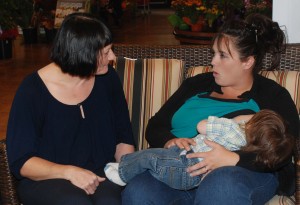This article is part 3 of a 3-part series on anger and parenting. See Part 1: How to Healthily Relate to Anger and Part 2: Anger and Parenting: Stigma or Opportunity?.
So, is this anger part of postpartum depression? Maybe.
I want to say first though that some anger/frustration/ irritability can be a normal part of a serious adjustment like having a child. It is also normal to feel angry when you don’t get much sleep, don’t get  adequate support, or your needs met. And it’s normal to feel frustrated at a constantly crying baby, or indeed a rambunctious testing toddler, especially in a society that in many ways isn’t child/parent-friendly. For more on anger and parenting see Anger and Parenting: Stigma or Opportunity.
adequate support, or your needs met. And it’s normal to feel frustrated at a constantly crying baby, or indeed a rambunctious testing toddler, especially in a society that in many ways isn’t child/parent-friendly. For more on anger and parenting see Anger and Parenting: Stigma or Opportunity.
However there are differences when anger is part of postpartum depression.
First a bit more about PPD. Postpartum depression is accepted as an umbrella term covering a range of psychiatric illness occurring after childbirth and (most agree) starting during the first postpartum year. (There is still debate as to the discrete diagnostic categories.) They include:
- Postpartum Adjustment Disorder/Postpartum Stress Syndrome
- Postpartum Depression
- Obsessive Compulsive Disorder (OCD)
- Postpartum Psychosis
- Post-traumatic Stress Disorder.
For more on these see PPD.
Anger and Postpartum depression
PPD is typically an agitated depression, marked by excessive anxiety. Indeed feelings of irritability, frustration, anger, even rage can be part of postpartum depression. These feelings can be pointed to your partner, yourself, your baby or your other children.
If you find yourself in arguments, yelling, fighting, withdrawing or isolating yourself, this can all be part of PPD. It can also include chronic dissatisfaction. It’s typically accompanied by related feelings of being trapped, resentful, and full of guilt.
Anger is more likely to be a symptom of PPD if a woman experiences a few other symptoms alongside it such as:
- excessive anxiety
- excessive weepiness
- insomnia
- fatigue
- pervasive feelings of sadness and hopelessness
- intrusive thoughts
- impaired concentration
- guilt and low energy
Anger and Postpartum Adjustment Disorder
Anger and irritation can also be a symptom of Postpartum Adjustment Disorder. Symptoms of this include:
- marked stress reaction
- low threshold for frustration
- transient moodiness
Adjustment Disorder is not a clinical depression, yet still is tough to navigate. Therapy can help. Adjustment Disorder can resolve without therapy but can cause ongoing difficulties for the mother. (source: Therapy and the Postpartum Woman, Karen Kleinman).
What now?
If you are a new-ish mom and are significantly distressed, regardless of whether you think you fit into one of these diagnostic categories, please reach out and get help. The right kind of support can make a huge difference. You don’t have to suffer alone and try to wait it out.
regardless of whether you think you fit into one of these diagnostic categories, please reach out and get help. The right kind of support can make a huge difference. You don’t have to suffer alone and try to wait it out.
Please call me, another therapist who focuses on PPD, or one of resources below.
Resources in Hamilton, Ontario
Women’s Health Concerns Clinic, St. Joes Hospital (self-referrals allowed). (905) 522-1155 ext. 33979.
COAST Crisis Outreach and Support Team 24/7 telephone support at 905 972-8338
The Woman’s Centre, Interval House. 905 522-0127. Crisis Line = 905-387-8881
Catholic Family Services 905 527-3823. No-cost counselling is available, even on a walk-in basis.
Suicide Crisis Line, Emergency Crisis Intervention only. 905 522-1477
Femme Encoute – 24/7 telephone support in French. 1-877-679-2229
Mother Matters, Women’s College Hospital – a 10-wk long online support group to residents of Ontario with at least 1 child under 1yr old
(If you know of other resources that should be added to this list, me let me know).

